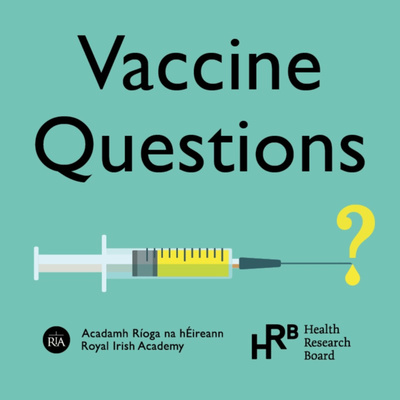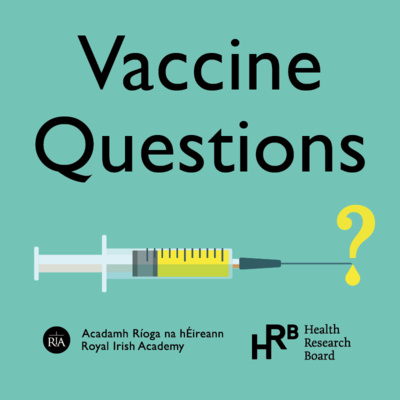Discover Vaccine Questions
Vaccine Questions

Vaccine Questions
Author: Royal Irish Academy
Subscribed: 5Played: 36Subscribe
Share
© Royal Irish Academy
Description
A podcast series on vaccines and vaccination, where we ask experts the questions you want answered.
Do you have questions about the coronavirus vaccines? Maybe you want to understand how they work? Maybe you wonder if they are safe for you to take? Or perhaps you are just anxious to know when and how you will be vaccinated?
In this podcast series, science journalist Dick Ahlstrom chats with experts in public health, immunology, virology, bioethics, statistics and behavioural science. He will ask them questions sent in by you and help make sense of the answers.
Do you have questions about the coronavirus vaccines? Maybe you want to understand how they work? Maybe you wonder if they are safe for you to take? Or perhaps you are just anxious to know when and how you will be vaccinated?
In this podcast series, science journalist Dick Ahlstrom chats with experts in public health, immunology, virology, bioethics, statistics and behavioural science. He will ask them questions sent in by you and help make sense of the answers.
8 Episodes
Reverse
In the final episode of this series, Professor of Immunology Christine Loscher discusses the vaccine rollout and answers questions on vaccines for teens, booster shots and more.
As we reach 70 percent of the population of Ireland vaccinated against COVID-19, host Dick Ahlstrom chats to immunologist Professor Christine Loscher about how Ireland has performed in terms of its vaccination programme, what we have learned about the virus and about vaccines over the last year and what’s new in terms of vaccine development. She also answers questions on the vaccination of children and teens and on the start of vaccine booster shots. Christine is a Full Professor of Immunology and Associate Dean for Research in the Faculty of Science & Health at DCU. In 2020 she established the DCU Covid-19 Research & Innovation Hub which currently has 16 funded projects aimed at novel solutions in the fight against Covid-19.
More information on COVID-19 vaccines
The RIA's Life and Medical Sciences Committee has published a revised expert statement on vaccines. The statement is written in plain English and provides accurate information on vaccines.
‘Vaccines: a life-saving choice expert statement’ by Kingston Mills MRIA, Bert Rima MRIA and Dick Ahlstrom:
You can find more information on vaccines and vaccination at:
http://gov.ie/covid19vaccine
http://hse.ie
http://immunisation.ie
This series is organised by the Life and Medical Sciences Committee in partnership with the Health Research Board
Behavioural economist, Professor Pete Lunn shares expert insights on how our behaviour impacts the spread of the COVI19 and what drives this behaviour.
Pete is head of the Economic and Social Research Institute's Behavioural Research Unit and a member of a subgroup that advises NPHET on public response to the pandemic. He tells Dick what questions this group has asked about public behaviour in the pandemic, and shares some of the surprising answers this research has revealed about how we balance risks and make decisions.
In our Vaccine Questions podcast Ep 7 Behavioural economist, Professor Pete Lunn shares expert insights on how our behaviour impacts the spread of the COVI19 and what drives this behaviour.
Pete is head of the Economic and Social Research Institute's Behavioural Research Unit and a member of a subgroup that advises NPHET on public response to the pandemic. He tells Dick what questions this group has asked about public behaviour in the pandemic, and shares some of the surprising answers this research has revealed about how we balance risks and make decisions.
This series is organised by the Royal Irish Academy Life and Medical Sciences Committee in partnership with the Health Research Board.
Chief Bioethics Officer at the Department of Health, Dr Siobhán O’Sullivan talks about the difficult decisions officials and individuals must grapple with in this pandemic and the values and principles which underpin them.
While science plays a vital role in informing decisions such as prioritisation for vaccination, these decisions are not made in a vacuum. They impact on all our lives and require assessment of legal, socio-economic factors, and judgements about what is right and wrong and what kind of society we want to live in. Siobhán explains how bioethics provides a framework that helps guide this decision making and Dick asks for her thoughts on complicated questions like should vaccination ever be mandatory, are vaccine passports fair, and are rich countries doing enough to ensure people in poorer countries have access to vaccines.
This series is organised by the Royal Irish Academy Life and Medical Sciences Committee in partnership with the Health Research Board.
In episode five Dick chats to Professor Jane Suiter, Director of the Institute for Future Media, Democracy and Society at DCU about what drives the spread of disinformation and how it can undermine vaccination programmes.
What is the difference between misinformation and disinformation and are they the same thing as fake news? Dick asks Jane to explain what these terms mean and they discuss the evolution of disinformation, what drives it, and what makes people susceptible to it. Jane also outlines some ways it can be tackled, by those who own or regulate social media and by us as everyday users of digital media.
This series is organised by the Royal Irish Academy Life and Medical Sciences Committee in partnership with the Health Research Board.
Emer Cooke, Head of the European Medicines Agency explains its role in assessing and authorising COVID19 vaccines, and Dick asks why should we trust the EMA to ensure that all the vaccines we receive are safe and reliable?
COVID19 vaccines can only become available to us here in Ireland once they are authorised by the European Commission following evaluation by the European Medicines Agency (EMA). In this episode, host Dick Ahlstrom talks to Emer Cooke, an Irish pharmacist who took on the role of Executive Director of the EMA in November 2020. She explains the role of the EMA and the steps they take in evaluating vaccines to ensure they are safe and effective and that the information they base that assessment on is robust and reliable. She also describes what the EMA does to be transparent and engage with the public, and she shares her perspective on the benefits of vaccines.
This series is organised by the Royal Irish Academy Life and Medical Sciences Committee in partnership with the Health Research Board.
Dr Lucy Jessop is Director of Public Health at the National Immunisation Office. In this episode she explains when, where and how people will get their vaccination shots, and answers lots of your questions around what side effects to expect.
Here's the link to a factsheet on vaccination for pregnant and breastfeeding women:
https://www.hse.ie/eng/health/immunisation/hcpinfo/covid19vaccineinfo4hps/qaiogniac.pdf
This series is organised by the Royal Irish Academy Life and Medical Sciences Committee in partnership with the Health Research Board.
Professor Philip Nolan explains the numbers we hear on the news and virologist Dr Gerald Barry answers your questions on vaccines.
News coverage of the pandemic is full of numbers and statistics. Daily figures of new COVID19 cases, hospitalisations and deaths are provided alongside other numbers like 7-day average case number, incidence of disease per hundred thousand, positivity rate and growth rate. Where do these figures come from and what can they tell us?
In this episode Dick talks to Professor Philip Nolan, Chair of the Irish Epidemiological Modelling Advisory Group to NPHET about the work being done behind the scenes to bring us the most accurate and up-to-date numbers and projections and Dick asks him whether mathematical models can be used to predict when vaccination will allow life to get back to normal. UCD based virologist Dr Gerald Barry answers your questions on vaccines; how well they halt transmission, how long they are effective for, and are they as affective in people with comprised immune systems.
This series is organised by the Royal Irish Academy Life and Medical Sciences Committee in partnership with the Health Research Board.
Luke O'Neil, MRIA speaks to Dick Ahlstrom, in the first episode of our new Vaccine podcast series, about the first COVID-19 vaccine given on the Island of Ireland, why this is such exciting news and why it is such an amazing achievement for science.
The first COVID-19 vaccine on the island of Ireland was given to a nurse in Belfast on 8 December 2020, and with the European Medicines Agency due to make a decision on the Pfizer vaccine on Monday, the Government of Ireland has also said its Covid-19 vaccination programme could begin before the new year.
Speaking to host Dick Ahlstrom, immunologist Professor Luke O’Neil, MRIA explains why this is such exciting news and why it is such an amazing achievement for science. He responds to some general concerns that people may have around vaccination, explaining the scientific and regulatory process in involved in vaccine approval. And he answers some specific questions sent in by people about vaccination for them or their loved ones.
In this podcast series, science journalist Dick Ahlstrom chats with experts in public health, immunology, virology, bioethics, statistics and behavioural science, asking them everything you ever wanted to know about vaccines and vaccination.
This series is organised by the Royal Irish Academy Life and Medical Sciences Committee







